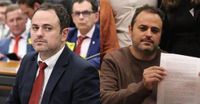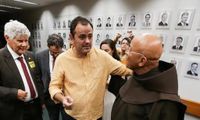On Thursday, April 17, 2025, Brazilian Deputy Glauber Braga (PSOL-RJ) announced the end of his hunger strike, which had lasted nine days, following an agreement with the President of the Chamber of Deputies, Hugo Motta (Republicanos-PB). The hunger strike, initiated on April 9, was a protest against the Ethics Council's recommendation to revoke his mandate, a process that has been contentious and heavily debated.
During his hunger strike, Braga consumed only water, serum, and isotonic drinks, leading to a weight loss of over five kilograms. He emphasized that while he was suspending the hunger strike, he was not abandoning his fight against what he termed "the oligarchic power" and other significant issues, including accountability for the murder of activist Marielle Franco.
Braga's hunger strike drew significant attention, and the agreement with Motta ensures that the process to revoke his mandate will not be analyzed until at least 60 days after the Constitution and Justice Commission (CCJ) deliberates on the matter. This was a crucial development for Braga, who has been under scrutiny for a physical altercation with a far-right activist linked to the Movimento Brasil Livre (MBL).
In a statement, Motta confirmed, "I guarantee that, after the deliberation of the CCJ, we will not submit the case of the deputy to the plenary before 60 days so that he can exercise his defense of his parliamentary mandate." This agreement was brokered with the help of fellow deputies Sâmia Bomfim (PSOL-SP) and Lindbergh Farias (PT-RJ), who played a vital role in facilitating discussions.
Before concluding his hunger strike, Braga sought the approval of a popular assembly, which included about thirty supporters, among them the Minister of Racial Equality, Anielle Franco. This gathering served to demonstrate solidarity and support for Braga's cause. He expressed gratitude to those who stood by him during his protest, stating, "I will announce the suspension of the hunger strike, but I want to make acknowledgments and then talk about politics: where we are, what the next steps are, and where we are going."
Braga's hunger strike was not only a personal protest but also a broader commentary on the political climate in Brazil. He criticized the ongoing issues surrounding the "secret budget" and called for accountability regarding the actions of various political figures. His commitment to these causes remains steadfast, despite the temporary suspension of his hunger strike.
The Ethics Council's decision to advance the impeachment process against Braga stemmed from allegations that he breached decorum by physically assaulting a MBL member during a heated exchange. The council's recommendation was approved by a vote of 13 to 5, prompting Braga's drastic action. He is now tasked with presenting his defense to the CCJ by April 22, 2025, where his legal team will argue against the proceedings.
As the political landscape continues to evolve, Braga's situation highlights the tensions within the Brazilian legislature, particularly regarding issues of accountability and the balance of power. The implications of this case extend beyond Braga himself, touching on the broader themes of political persecution and the struggles faced by those who challenge the status quo.
Braga's allies, including Lindbergh Farias, have expressed optimism about the upcoming deliberations, indicating that the impeachment process might not be addressed until the next legislative semester. This delay provides Braga with the opportunity to fortify his defense and potentially sway opinions among his colleagues.
In light of these developments, the political community is watching closely. The outcome of Braga's case could set a significant precedent for how similar situations are handled in the future. The balance of power within the Chamber of Deputies, particularly regarding the treatment of dissenting voices, is at stake.
While Braga has temporarily suspended his hunger strike, his fight is far from over. He has vowed to continue advocating for justice and accountability, making it clear that his commitment to these causes remains unyielding. As the situation unfolds, it is evident that the political battles in Brazil will continue to be intense and multifaceted.
As Braga prepares for the next steps in his defense, the coming weeks will be critical. The political ramifications of this situation will likely resonate throughout the country, influencing public perception and potentially shaping future political dynamics.
In a statement reflecting on the support he received during his hunger strike, Braga remarked, "This suspension of my hunger strike comes from a message that demonstrated, through all this solidarity, a retreat, an important signal against the persecution that was operating here." His words encapsulate the complex interplay of personal struggle and broader political activism that defines his current predicament.
As the political landscape shifts, the eyes of Brazil remain fixed on Glauber Braga and the unfolding events surrounding his mandate. The outcome of this case will be pivotal, not only for Braga but for the principles of democracy and justice in Brazil.









